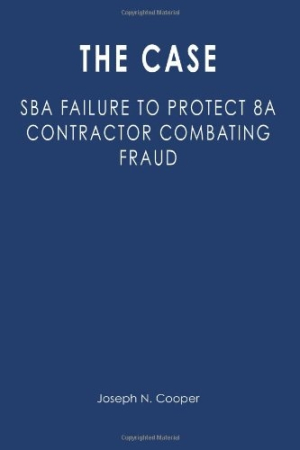The Case
SBA Failure to Protect 8a Contractor Combating Fraud
The Case tells the story of J. Cooper & Associates (JCA), a small, minority-owned business that was awarded a contract by the Immigration and Naturalization Service (INS) as part of a program administered by the Small Business Administration (SBA). The company then learned that the contract would be rescinded and given to larger companies misrepresenting themselves as small “disadvantaged” businesses.
Joseph Cooper, who owned JCA, offers an introductory overview of this situation in The Case, but the bulk of the book basically reproduces the case his company presented to the United States Court of Federal Claims. As such, most of the text reads somewhat like a legal brief, since the majority of the content is derived from the argument itself.
Cooper focuses largely on the technical aspects of the dispute, namely the contracts and letters that were executed, details about who said what, and disputes over estimates and invoices. His case claims that the SBA did not assist JCA in dealing with the INS, and that the INS (abruptly and without apparent cause) chose to purchase services from other contractors after contracting JCA for the work.
The obligations of the INS contract were of such significance that JCA had to make investments in staff to execute the work. Sadly, the result of the INS’s alleged breach of contract, which included failure to pay invoices from JCA in a timely manner and in full, was the eventual dissolution of the firm. Cooper himself was forced into personal bankruptcy.
Despite the fact that the INS chose to work with firms that misrepresented themselves, the court did not find in Cooper’s favor. Cooper writes, “Many government investigations and private studies conducted since 2003 have verified that hundreds of government contracts set aside for small businesses have instead been awarded to Fortune 500 corporations claiming to be small businesses.”
According to the SBA, small businesses (defined as firms with fewer than 500 employees) represent 99.7 percent of all businesses. As such, they fuel the nation’s economy. Given this fact, one would hope small businesses would receive better treatment than this case demonstrates. Small business owners will likely be disturbed by the outcome of the case, if not by Cooper’s assessment of how he was treated: “I can honestly say there is an arrogant attitude of power and insensitivity toward small businesses among many elected officials, contracting officers, and program staffers. Many government workers throughout the SBA, INS, and the Justice Department were not responsive to my needs.”
While The Case is worthy of attention, the overall presentation would have greater impact if it were structured with more narrative and less reliance on legalities and legal observation. Nevertheless, the reader who wades through the text will get a sense of some of the difficulties of doing business with the federal government.
Reviewed by
Barry Silverstein
Disclosure: This article is not an endorsement, but a review. The publisher of this book provided free copies of the book and paid a small fee to have their book reviewed by a professional reviewer. Foreword Reviews and Clarion Reviews make no guarantee that the publisher will receive a positive review. Foreword Magazine, Inc. is disclosing this in accordance with the Federal Trade Commission’s 16 CFR, Part 255.

